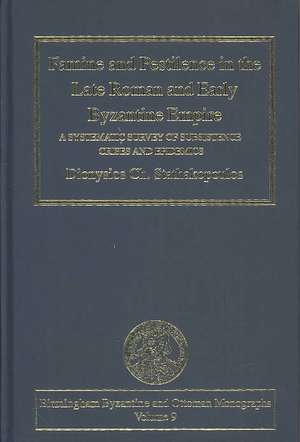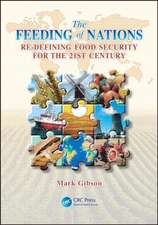Famine and Pestilence in the Late Roman and Early Byzantine Empire: A Systematic Survey of Subsistence Crises and Epidemics: Birmingham Byzantine and Ottoman Studies
Autor Dionysios Ch. Stathakopoulosen Limba Engleză Hardback – 10 feb 2004
Din seria Birmingham Byzantine and Ottoman Studies
-
 Preț: 388.46 lei
Preț: 388.46 lei -
 Preț: 310.65 lei
Preț: 310.65 lei - 15%
 Preț: 266.13 lei
Preț: 266.13 lei -
 Preț: 381.98 lei
Preț: 381.98 lei -
 Preț: 397.38 lei
Preț: 397.38 lei - 21%
 Preț: 258.06 lei
Preț: 258.06 lei -
 Preț: 399.29 lei
Preț: 399.29 lei - 18%
 Preț: 1009.91 lei
Preț: 1009.91 lei - 15%
 Preț: 242.74 lei
Preț: 242.74 lei -
 Preț: 373.43 lei
Preț: 373.43 lei - 18%
 Preț: 1003.43 lei
Preț: 1003.43 lei - 22%
 Preț: 328.20 lei
Preț: 328.20 lei -
 Preț: 389.38 lei
Preț: 389.38 lei - 25%
 Preț: 324.16 lei
Preț: 324.16 lei -
 Preț: 404.47 lei
Preț: 404.47 lei - 17%
 Preț: 256.87 lei
Preț: 256.87 lei - 25%
 Preț: 324.16 lei
Preț: 324.16 lei -
 Preț: 389.38 lei
Preț: 389.38 lei - 25%
 Preț: 776.84 lei
Preț: 776.84 lei - 25%
 Preț: 834.82 lei
Preț: 834.82 lei -
 Preț: 387.91 lei
Preț: 387.91 lei -
 Preț: 311.41 lei
Preț: 311.41 lei -
 Preț: 469.34 lei
Preț: 469.34 lei -
 Preț: 388.72 lei
Preț: 388.72 lei - 30%
 Preț: 771.95 lei
Preț: 771.95 lei -
 Preț: 405.83 lei
Preț: 405.83 lei - 18%
 Preț: 1062.31 lei
Preț: 1062.31 lei - 18%
 Preț: 1008.53 lei
Preț: 1008.53 lei - 30%
 Preț: 873.95 lei
Preț: 873.95 lei -
 Preț: 489.26 lei
Preț: 489.26 lei
Preț: 766.00 lei
Preț vechi: 1007.11 lei
-24% Nou
Puncte Express: 1149
Preț estimativ în valută:
146.57€ • 153.03$ • 121.31£
146.57€ • 153.03$ • 121.31£
Carte tipărită la comandă
Livrare economică 05-19 aprilie
Preluare comenzi: 021 569.72.76
Specificații
ISBN-13: 9780754630210
ISBN-10: 0754630218
Pagini: 432
Dimensiuni: 156 x 234 x 25 mm
Greutate: 2.1 kg
Ediția:1
Editura: Taylor & Francis
Colecția Routledge
Seria Birmingham Byzantine and Ottoman Studies
Locul publicării:Oxford, United Kingdom
ISBN-10: 0754630218
Pagini: 432
Dimensiuni: 156 x 234 x 25 mm
Greutate: 2.1 kg
Ediția:1
Editura: Taylor & Francis
Colecția Routledge
Seria Birmingham Byzantine and Ottoman Studies
Locul publicării:Oxford, United Kingdom
Cuprins
Contents: Preface; Introduction: Negotiating with the dead; Typology of Crises: The late Roman and early Byzantine empire; A quantitative overview; Subsistence crises: causes, location, duration and range: Nature-induced crises; Human-induced crises; Duration, location and range; Social response: Market activity; Response of authorities; Popular reaction; Epidemic diseases: Introduction; Smallpox; Infections of the gastro-intestinal tract; Other infectious diseases; Mass poisonings; The Justinianic plague: The chronology of the plague; The epidemiology of the plague; Was the Justinianic plague a pandemic of 'true plague'?; Social response; Results: Mortality; Shortage of human resources; Conclusion: 'History that stands still?'; Catalogue of Epidemics and Famines from 284 to 750 AD: Catalogue; Appendices; Bibliography; Index.
Recenzii
'Dionysios Stathakopoulos's new book [...] is a feast and a blessing... unique, thorough, and extremely welcome analytical compendium of famine and disease crises in the ancient world.' Speculum
Descriere
This book presents the first analytical account in English of the history of subsistence crises and epidemic diseases in Late Antiquity. Based on a catalogue of all such events in the East Roman/Byzantine empire between 284 and 750, it gives an authoritative analysis of the causes, effects and internal mechanisms of these crises and incorporates modern medical and physiological data on epidemics and famines. Its interest is both in the history of medicine and the history of Late Antiquity, especially its social and demographic aspects. Dr Stathakopoulos thus provides both a work of reference for information on particular events (e.g. the 6th-century Justinianic plague) and a comprehensive analysis of subsistence crises and epidemics as agents of historical causation. As such he makes an important contribution to the ongoing debate on Late Antiquity, bringing a fresh perspective to comment on the characteristic features that shaped this period and differentiate it from Antiquity and the Middle Ages.





